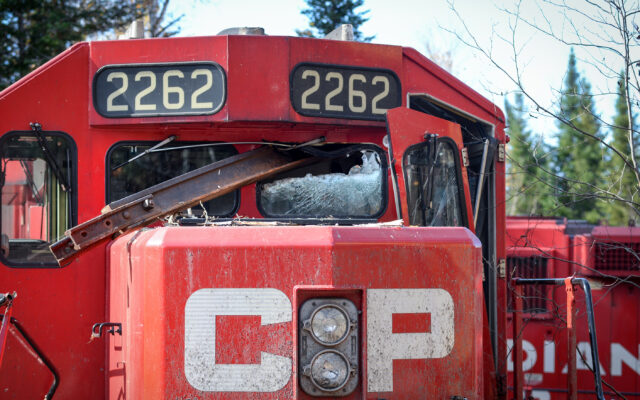
Maine train engineer sues Canadian Pacific after he was nearly impaled in derailment
By Marie Weidmayer, Bangor Daily News Staff
A train engineer is suing Canadian Pacific Railway, saying the company should have known there was a high risk that tracks would be washed out before a train derailment in rural Maine nearly three years ago.
Louis Meyers of Dover-Foxcroft filed a lawsuit against Canadian Pacific on July 23 in U.S. District Court of Maine in Bangor. The locomotive engineer alleges the company is federally liable and was negligent, in part, because it failed to implement plans for severe weather and monitor track conditions.
Meyers was aboard a train that derailed around 3:15 a.m. on Oct. 19, 2022, when it rode over tracks that had been washed out. Three engines and six railcars derailed, the Milo Fire Department said at the time. There were about 50 cars in the train, the lawsuit said.
Meyers asked a judge to award him compensation for lost wages, medical expenses and loss of enjoyment of life.
Meyers was thrown out of his seat during the crash. He had permanent physical and psychological injuries from the derailment and was unable to return to work, the lawsuit said.
At the time, the fire department said people were uninjured but taken to the hospital for examinations.
A Canadian Pacific spokesperson said the company had no comment.
Heavy rain hit the region in the days before the derailment, the lawsuit said. The route had visibly swollen streams and rivers, which meant the adjacent tracks had an increased risk of being washed out. That would threaten the safety of crew operating trains, the lawsuit said.
Parts of Maine were under flood warnings in the days before the derailment when around 5 inches of rain fell, according to previous reports from the Bangor Daily News.
Canadian Pacific managers told Meyers and the crew to operate the train anyways, the lawsuit said. The crew was not given speed restrictions and was not told to conduct special inspections of the tracks before operating the train, according to the lawsuit.
Meyers was in the cab of the front locomotive while a colleague operated the train, which was traveling around 25 mph, the lawsuit said.
The person operating the train “suddenly yelled out in fear” because the tracks ahead were suspended in air above a swollen creek, according to the lawsuit. Heavy rains had washed out soil and ballast that supported the tracks.
The locomotive rolled onto the suspended tracks and then fell into a creek, the lawsuit said. A piece of the steel track pierced the cab window, nearly impaling Meyers in the head, according to the lawsuit.
No court dates are scheduled.